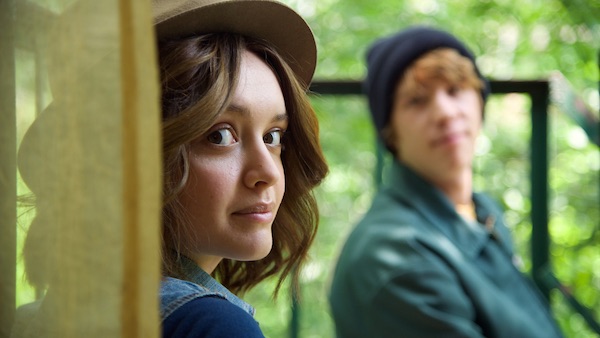Me and Earl and the Dying Girl Review
Posted on September 27, 2015 By John Gilpatrick 2015, Movie Reviews
Me and Earl and the Dying Girl has all the traits of a Sundance (and Sundance only) hit. A cast of young unknowns and veteran comedians tell the story of a quirky trio of angsty teens dealing with serious problems beyond their years and current levels of emotional maturity. Classic foreign films play a major role, and its mix of tragic and comic is the type of thing that has played like gangbusters at Park City countless times in the past. Appropriately, Me and Earl and the Dying Girl won both the Audience Award and the Grand Jury Prize this past January, and it was scooped up by Fox Searchlight for quite a sum of money. A mid-summer release date put a cherry on top of this perfect Sundance sundae.
It never quite took off—critically or with the public—the way the studio hoped, I’m sure. But it’s a film that nonetheless spoke to me. It’s truthful, and while its truths are youthful and admittedly not fully-formed, it’s OK because it’s a movie about high schoolers, not Kant or Voltaire. This is the cinematic equivalent of an Ed Sheeran song. Substitute “photograph†with “pillow named Francesca,†and you basically have Me and Earl and the Dying Girl. And like that damn song, I cannot get how this film made me feel out of my head.
Greg (Thomas Mann) is the “Me†of the film’s title. He’s a “floater†within his high school, the kid who’s cordial-ish with everyone and close friends with no one. Even Earl (RJ Cyler), with whom he spends every lunch and most free time, is only ever referred to by Greg as a co-worker. Their business: making bad, punny versions of classic films—like “A Sockwork Orange†and “My Dinner with Andre the Giantâ€.
“The Dying Girl†is Rachel (Olivia Cooke), and she has leukemia. Though she’s a member the social group Greg refers to as Boring Jewish Girls: Subgroup 2A, the two strike up an odd friendship after Greg’s mom forces him to hang out with her. He helps her come to terms with her illness (as best as a teen girl can come to terms with such a thing), while she helps him overcome some of his more self-loathing tendencies. All the while, they share laughs over Greg and Earl’s films.
A hot girl at their school suggests to Greg that he should make a film for Rachel, and this project really fast-forwards Greg’s emotional growth. He realizes he must do something worthy of his new friend, which is to acknowledge that Rachel really is a friend, not just a girl his mom made him hang out with. There are glowing, blinking, giant signs trying to point the film down Romance Road, but director Alfonso Gomez-Rejon and screenwriter Jesse Andrews (adapting his own novel) have something less grand but more interesting in mind. Their lead character is an awkward, frightened individual who would rather call himself friendless than make a faux pas and find himself in a socially compromised situation. This leads to a series of really selfish, unfortunate choices, but some of them improbably help a sick young woman, and they all eventually lead to a place of interpersonal enlightenment. In other words, the way Greg deals with his problems is sometimes uncomfortable, but it feels like a heightened, expedited version of what growing up is really like.
The film’s attitude toward filmmaking and cinephilia is similarly simplistic but also similarly appropriate. It’s so easy to identify with characters who are trying to figure it all out and want to use cinema as a means of doing so, no matter how juvenile their attempts might seem on the surface. Though Greg and Earl’s films are crude, what the represent is a path to adulthood. As someone who went through the same thing, Me and Earl and the Dying Girl is immensely relatable.
It helps, of course, to have some expert performances front and center acting out this relatable dialogue. Thomas Mann was previously unknown to me, but he showed some real chops as Greg. Even more impressive is the work of Olivia Cooke, another one with but a handful of credits to her name, whose Rachel is complex and so much more than the film’s title gives her credit for. Able supporting work is provided by Connie Britton, Nick Offerman, Molly Shannon, and Jon Bernthal as the adults who shape these kids’ lives.
You wouldn’t be mistaken for thinking Me and Earl and the Dying Girl was just an indie riff on The Fault in Our Stars, but it has something more heartfelt on its mind. The result is a beautiful film that everyone involved in should be proud of.
2015, 3.5 Stars, Alfonso Gomez-Rejon, Connie Britton, Jesse Andrews, Jon Bernthal, Me and Earl and the Dying Girl, Molly Shannon, Nick Offerman, Olivia Cooke, RJ Cyler, Thomas Mann

















Pingback: Me and Earl and the Dying Girl Movie Review
Pingback: Reviews: Me and Earl and the Dying Girl (2015) | Online Film Critics Society